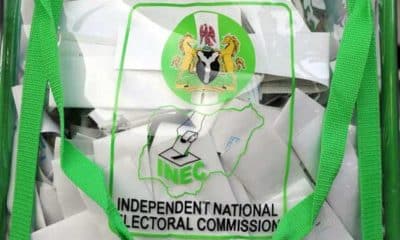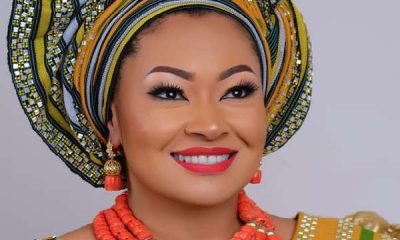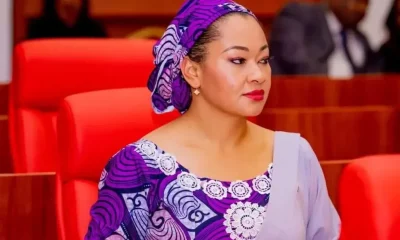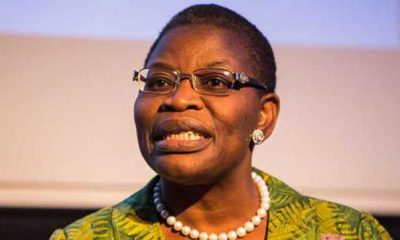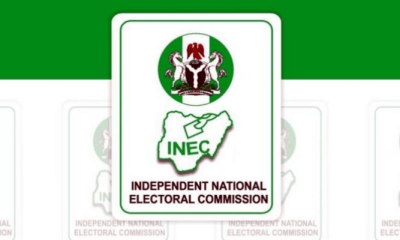Nigeria News
INEC Seeks To Ban Politicians From Carrying Huge Cash On Election Day
The Independent National Electoral Commission (INEC) has urged the National Assembly to implement more stringent regulations prohibiting the possession of significant amounts of cash in polling locations.
This initiative aims to combat vote-buying and other forms of electoral misconduct.
Naija News reports that during a consultative meeting held in Abuja over the weekend, which included security personnel and a technical committee focused on electoral law reforms, INEC’s Director of Litigation and Prosecution, Tanimu Muhammed, SAN, expressed serious concerns regarding the escalating issue of vote-buying, which poses a substantial risk to Nigeria’s democratic integrity.
This meeting was organized by the Joint Senate and House of Representatives Committees on Electoral Matters, in partnership with the Policy and Legal Advocacy Centre (PLAC) and with support from the UK Foreign, Commonwealth, and Development Office (FCDO).
It served as a forum for stakeholders to discuss electoral security and necessary legal changes.
The INEC representative pointed out that politicians frequently defend their possession of large sums of cash on election day by referencing payments to party agents and logistical needs.
However, he cautioned that the unregulated cash flow at polling stations has exacerbated vote-buying and undermined the credibility of elections. To mitigate this issue, Muhammed proposed that individuals should be restricted to carrying no more than ₦50,000 in polling areas.
“Vote-buying remains one of the biggest threats to credible elections in Nigeria. We need legislation that not only criminalizes this practice but also puts preventive measures in place,” Muhammed stated.
The commission has called on legislators to focus on amendments aimed at eliminating loopholes that are being taken advantage of by political figures.
In addition to concerns regarding vote-buying, officials from INEC emphasized their persistent request to create an Electoral Offenses Commission, contending that the electoral body does not possess the necessary capabilities to prosecute violators adequately.
While INEC is making efforts to manage prosecutions, there is a pressing need for a specialized institution equipped with the legal power and resources to thoroughly investigate and prosecute electoral offenses, as stated by Muhammed.
“The creation of an Electoral Offenses Commission would ensure that vote-buying, ballot snatching, and other crimes are met with swift legal action,” he added.
On his part, the Ondo Resident Electoral Commissioner, Oluwatoyin Babalola, stressed that reducing cash transactions at polling units would make it harder for politicians to influence voters with financial inducements.
“If we set a cash limit, security agencies will have clearer guidelines on what constitutes an electoral offense, making enforcement easier,” she added.
In addressing the concerns raised by INEC, the security agencies present at the meeting reiterated their dedication to facilitating free and fair elections.
Nonetheless, they recognized the difficulties faced, especially regarding logistics and coordination.
Police Face Logistic Issues During Elections
The Commissioner of Police responsible for election planning and evaluation, Abayomi Shogunle, who stood in for the Inspector General of Police, emphasized that insufficient resources frequently hinder law enforcement operations during electoral processes.
“We face major logistical challenges, from deploying officers to remote areas to ensuring real-time communication during elections. These are issues that need to be addressed if we are to effectively enforce electoral laws,” Shogunle said.
Despite these challenges, security agencies pledged to remain neutral and professional in carrying out their duties.
Responding to the concerns raised, the Chairman of the House Committee on Electoral Matters, Hon. Adebayo Balogun, assured that all issues discussed would be addressed in future electoral reforms.
He announced plans for a 2025 Electoral Act to replace the current 2022 version, which he said had exposed gaps during the 2023 elections.
“The 2022 Electoral Act was a significant step forward, but its implementation in the last general elections showed areas that need improvement. We are committed to strengthening our electoral laws to reflect the realities of our democracy,” Balogun said.
He underscored the need for heightened awareness among political parties, INEC officials, and civil society organizations regarding the risks associated with vote-buying and other electoral misconduct and the need for legislative reforms.
The citizens of Nigeria are entitled to a trustworthy electoral process. It is imperative that our laws are not only robust in theory but are also rigorously enforced, Balogun stated.
The Senate Chairman on Electoral Matters, Senator Sharafadeen Alli, remarked that although the 2022 Electoral Act was initially viewed as thorough, its execution has exposed deficiencies that require rectification.
“This meeting is a step towards strengthening our electoral system. The reforms we propose must reflect lessons learned from past elections and ensure that our democracy continues to evolve positively,” Alli said.

